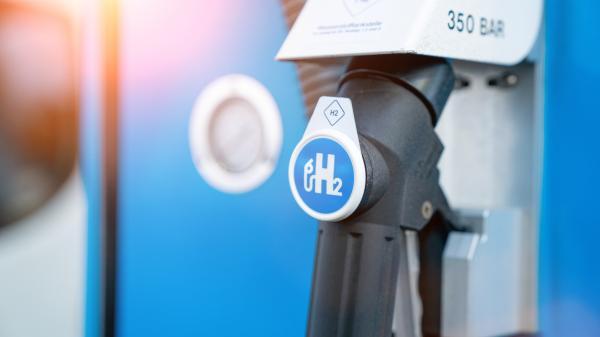
€40 million finance contract signed for the Corridor H2 project in the Occitanie Region, France
The Occitanie Region is committed to the development of new future energy sources that do not produce greenhouse gases, and in 2019 adopted a €150 million Green Hydrogen Plan to accelerate the large-scale, region-wide roll-out of hydrogen-based solutions. At the opening of the Energaïa fair, Region President Carole Delga and European Investment Bank (EIB) Vice-President Ambroise Fayolle announced that that they had signed a €40 million loan contract to finance the Corridor H2 project, unique in Europe.
The Occitanie Region set up the Corridor H2 project together with its Ad’Occ (Economic Development Agency) and AREC (Regional Energy-Climate Agency) agencies. This project covers the development of hydrogen distribution stations on a north-south axis running from the Mediterranean to the North Sea, as well as the secondary motorway routes in Occitanie (including the A61 and A20), and the development of a fleet of heavy goods and passenger vehicles (trucks and buses).
The Corridor H2 project covers:
- Cold chain logistics (refrigerated units), with fully electric, hydrogen-powered solutions. They can be installed on new or existing trailers;
- Heavy vehicles, particularly straight trucks (16/27 tonnes), including for local distribution and collection, and tractor trucks (44 tonnes) for long-haul national and European transport;
- Lio buses deployed by SPL “point-to-point” in Tarn (Gaillac).
Eight stations will be installed in order to provide hydrogen charging points as close as possible to major transport routes. Infrastructure for the first hydrogen-powered electric trucks will also be set up according to when these vehicles become available on the European market.
The goal is therefore to deploy the following by 2023:
- 20 retrofitted refrigerated units (vehicle's original engine replaced with hydrogen fuel cell), 40 refrigerated trailers, 40 H2-powered trucks and 15 retrofitted Lio buses;
- Eight hydrogen stations, i.e. 225 tonnes of H2 distributed a year, and 2.6 million litres of diesel not used a year;
- Two green hydrogen production plants in Occitanie.
In total, the Corridor H2 project will avoid the use of 2.6 million tonnes of diesel a year.
A true European-scale project, Corridor H2 will benefit from the contributions of French and European regions in creating the north-south European corridor.
A promising region-EIB partnership
Worth around €110 million, the Corridor H2 project will receive a €40 million EIB loan. This financing falls under the EU bank's priority action to mitigate the effects of climate change. The EIB is convinced that hydrogen technologies can play a key role in accelerating the energy transition, and has stepped up its support for project promoters also benefiting from its expertise.
“This project is a milestone in the development of hydrogen in cities and regions. That is why I am very pleased to be signing this new financing with the Occitanie Region, with which we have entered into a high quality partnership,” said EIB Vice-President Ambroise Fayolle. “Financing new technologies and innovative projects contributing to the energy transition and the improvement of people’s daily lives is a priority for the EU climate bank. In this way, we are preparing the future for younger generations.”
This agreement is fully in line with the “National Strategy for the Development of Decarbonised Hydrogen in France” announced on 8 September 2020. It lays the groundwork for a new era for hydrogen as a future strategic industry in France and Europe.
The Occitanie Region has also submitted an application for the MIE Blending European call for projects. Occitanie is the first French region to be able to submit an application. Several million euros in subsidies could be allocated across the region if the application is selected, in addition to the €40 million already allocated under the loan. Call for projects may be launched by the Occitanie Region in the first quarter to allocate these subsidies. Companies producing and distributing renewable H2, transport companies acquiring hydrogen refrigerated trucks and trailers, and the region itself with the purchase of 15 H2 buses will be able to benefit from these funds. AREC would act as a co-investor in infrastructure projects.
“Occitanie has always positioned itself as a pioneer in the development of the hydrogen sector across the region. This will has been demonstrated since 2019 with the adoption of an unprecedented €150 million Green Hydrogen Plan, which should make it possible to achieve our objective of becoming Europe's first positive-energy region by 2050. The contract we are signing today with the European Investment Bank under the Corridor H2 project once again shows our determination to make hydrogen an energy of the future in Occitanie. It also highlights the importance of our connections with the EU, which is fully engaging with the implementation of the energy transition via the financial support it provides,” added Carole Delga.
As the EU climate bank, the EIB decided to increase financing for projects supporting climate and environmental objectives, bringing them up to 50% of its activities by 2025. This means that the EIB Group will mobilise at least €1 trillion by 2030 to promote investments helping to meet these goals. In 2019, the EIB dedicated 47% of its financing in France – i.e. €3.28 billion – to combating climate change.